We have Molly Bloom and Martin Lanik here. You’ve probably seen the movie, Molly’s Game, and it’s based on her life. She wrote a bestselling book and it is fascinating what she’s gone through. She’s become an inspirational keynote speaker and an entrepreneur. Martin Lanik is a bestselling author. He can teach you how to be a leader in his new book, The Leader Habit. It’s micro habits, which is fascinating of how simple it is to improve our leadership skills.
Listen to the podcast here
Molly’s Game with Molly Bloom
I am here with Molly Bloom who is an American entrepreneur and author of the 2014 memoir Molly’s Game: The True Story Of The 26-Year-Old Woman Behind The Most Exclusive, High-Stakes Underground Poker Game in the World. You’ve probably seen the movie. I’m interested in talking to you, Molly, because this movie caught my attention. I had not read the book before that, but it was such a fascinating story. Thank you for being here.
Thanks for having me on.
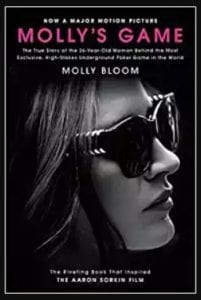
Molly’s Game: The True Story of the 26-Year-Old Woman Behind the Most Exclusive, High-Stakes Underground Poker Game in the World
You grew up with such an interesting family. Your father reminded me a little bit of my father. My father was born legally blind. He had 2% vision, but his whole family was super competitive. He wanted us to do the things he couldn’t do. I was watching your dad and it reminded me a little bit of mine. What was it like to watch this movie about your life? It’s hard probably enough to live it, to write about it and then now you’ve got everybody experience it in 3D in front of everybody. Did you feel it represented your story well? Was it weird because they made it Hollywood?
This has been a multistep process. First came writing the book, then came getting arrested and having to go in as much or more detail with my criminal attorney as I did in the book. Pitching the movie to Aaron Sorkin because he was my favorite writer. He was my top and I got super lucky that the story resonated with him. Spending eight months with him and his team, intimately going over the story again. It’s funny how adaptable we are as humans. You can be in the most extraordinary circumstances and then over time you adapt to it. It wasn’t as weird as you would think because it had become a part of my life for four years. At the same time, it was also weird. I couldn’t process it. The producers and Aaron said to me, “You need to sit and watch this movie by yourself in a room,” and I’m like, “If I do that, I’m going to pick it apart. I want to sit at the Toronto Film Festival when it premieres with my family and 2,000 other people.” Five minutes before the movie started, I was like, “Where’s the exit? I need to get out of here.” How am I going to live through the next two hours and 25 minutes of standing on stage in my underwear? This is a testimony and the answer to your question. I felt honored by the movie that Aaron wrote and directed. I’m grateful at the story that he told that it was a magical moment.
The premise is you were trained to become an Olympic skier when you young. When you got hurt trying out for the Olympics, you had to go in different directions. You’ve always been this driven person. You happen to get into this job that landed you with this high-stakes poker game in LA. You’ve got around all these wealthy individuals, sports figures, Hollywood celebrities. It ends with you pleading guilty to reduce charges of problems that you got into. Can you tell a little bit about the background of the story? We know about your background as an Olympic skier. Once you get to Los Angeles and you took this job, I’m curious how that led to the poker game?
I grew up with two superhuman brothers. Truly these kids were prodigies from the get-go. Jordan was beating the adults in my family at chess at four. He went on to become the Harvard-educated cardiothoracic surgeon. Jeremy was an incredible athlete from the get-go. He is a two-time Olympian. He was number one in the world on three consecutive world championships. He went from the Turin Olympics to the NFL Combine and got drafted fifth round to the Eagles. This was the crowd I was playing with. I felt invisible. I felt overlooked. I went out into the world with this determination to fix that. I didn’t know how I was going to do it. I thought it would be by my skiing career. I thought it would be going to an Ivy League law school.
In this year that I took off in between law school and after I had to retire from skiing, I went to Los Angeles to get away from the constant reminders of skiing because my heart was broken. I got a waitressing job and an executive assistant job. I was working all these small jobs. My boss at the time said, “I need you to serve drinks at my poker game.” I’m thinking overgrown frat boys, red solo cups, how hard can this be? It will be not compelling as all the other nights I’m serving drinks. The players start to arrive and it’s heads of studios, rappers, A-list actors, some of the most famous, some of the richest, some of the most powerful people on earth.
I had this lightbulb moment. I didn’t know anything about poker. I didn’t know anything about what was going on. I saw that these were ten people who truly the world would vie to get in front of. To have access to the things they have access to, to build this network. I saw that whatever was going on at that table had captivated these people who could be anywhere doing anything. I made $3,000 at the end of the night. I’m like, “This is interesting. I want to stay here.” Over the next six months, I was like, “I can see how to turn this into a business.” I first learned the rules, the objective and the language of poker because that was the product.
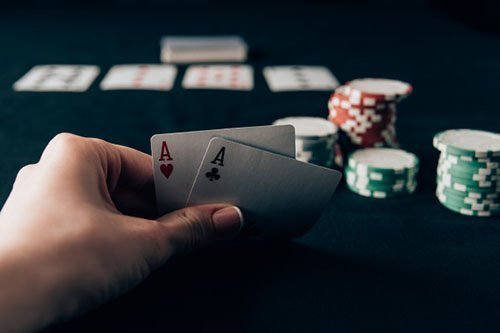
Leader Habit: Poker was offering them escapism. They get to walk into this room and feel like James Bond for a night.
Then I started to study the customer. I started to try to look at what motivated them and what this thing was all about. What it came to is that these guys could have anything they wanted. Things didn’t matter to them. The thing that this poker game was offering them was escapism. They get to walk in this room and feel like James Bond for a night. I started to build on that. I started to look at ways that I could expand on these transformational experiences. Ultimately took over the game and I ran it a business. I ran it from the position of a business, like a startup.
I became not only the owner-operator, but I also became the bank. I was extending credit. If somebody sift the game, I would cover it. It was lucrative and it was exciting. Somewhere along the way I got a lot lost. The money got to me. The more it got to me, the more I want more money. I want more games. I went off the rails. I took what was a legal business at the time and I made a choice to take a percentage of the pots to cover my downside to cover my risk. That was when it became illegal. The law of the arm came down swiftly on me. They knew about this game. I’m sure they were thinking of like, “How can we let this continue? This is $100 million poker game,” and so I got arrested by the Feds. They seized my assets. That was what I needed truly. It’s easier for me to say that now I’ve got some perspective and I know my way out. My way out worked.
You went through a lot. If that was pretty true to scale what happened. There were many things that were fascinating to me about your story. I understand the thrill of the power. There’s a point where you’re taking drugs, you’re trying to keep up and you’ve got all this stuff going on. You’ve got the Russians beating you up. You did not seem scared. The way Jessica portrayed you was this strong person. You’ve got a room full of Russians and all the things that you had, wasn’t there this underlying gnawing like, “These guys could kill me. This is probably not a good idea.”
When I look at that movie, I look at my choices, and I look at who I became during that time, it’s shocking. I was all hopped up on ego, lack of sleep and everyone around me was doing crazy things. It was a crazy world. I had to do a lot of work on fear when I was a little kid. I wasn’t born brave. I was a kid and I was in a lot of fear when I was little. I quickly saw that that didn’t work in my life. My dad would not tolerate fear. From a young age, I learned how to overcome it. It’s an awesome skill to have. It’s also a dangerous skill to have. Sometimes fear is there to alert you to the fact that, “Girl, you’re in trouble.” You combine pills, alcohol and millions of dollars into the equation and you’ve got yourself a dangerous concoction. It was a good lesson for me.
[bctt tweet=”Sometimes fear is there to alert you to the fact that you’re in trouble.” username=””]The most prolific thing that came from all the craziness that I caused, whether it’s getting beaten up by the mob, getting arrested by seventeen FBI agents at gunpoint or having the Department of Justice seize all my assets. All these crazy things that happened that were of my own making. That took a big emotional toll on me. I got desperate, I was helpless and hopeless that I did this work of taking an honest, rigorous look at who I was in the world. Owning it all and then making a committed decision to not be that person anymore. It helped me bring the center of gravity within. Instead of outside of me, which it had been my whole life and to gain humility. That path was definitely hugely helped by being part of a twelve-step program. The twelve steps are a guidebook for doing that work, and then also meditation. It took the IRS, the DOJ, the FBI and the mob to get me to grow up.
They show you being arrested, but they don’t show what it was when they threw you in jail or wherever they took you at that point. Did it hit you at that point? How scared were you?
That was the most terrified I’ve ever been in my life.
Worse than the guy beating you up?
Way worse. I knew what that was about. It’s on a different level. You’re in survival mode. You’re in fight or flight. When you’re sitting in a jail cell and they’re like, “We don’t know how long you’re going to be here,” and the press release is like, “She’s looking at 90 years.” That’s where I’m like, “I can’t solve this.” After the mob guy left, I was like, “I know what they want. I have a choice to make. I’m either going to partner with the mob, which was not an option for me, or I’m going to walk away,” and then twisted good luck, bad luck situation. They all got taken down in the biggest New York City mob take down in history and they went away. I could understand what that was. I couldn’t predict what was going to happen to me and how long I was going to be there. I realized quickly, “You have to do something to stay sane here.” There were these cement squares in the cell. I started to come up with equations to figure out how many there were in the entire building because otherwise, I was going to lose my mind.
You ended up not getting the worst punishment in the world. That must have shocked you. You ended up with probation, $200,000 fine and 200 hours of community service. You got off easy compared to what you could have. I thought it was interesting how you held out to not want to throw people under the bus too. They made that clear in the book. I’m going to list some names and you don’t have to deny or say the names. On the internet you hear that some of the people in the games were Leo DiCaprio, Tobey Maguire, Ben Affleck, Alex Rodriguez, Matt Damon, Pete Sampras, Macaulay Culkin, the list goes on and on. In the movie, you said you gave four names because they’d already been disclosed.
Some people had admitted in the public medium that they’d been part of these games. My moral agreement around that was like, “They’ve owned it. The press has reported it, but I’m not willing to tell stories about them that could harm their life. Innocuous stories, I can do that.”
[bctt tweet=”When you’re sitting in a jail cell, you’re in survival mode. You’re in fight or flight” username=””]I kept thinking if you were my daughter, what would I do? Your mother must have freaked out, and your father as well. He handled it pretty well, the way you portrayed it in the movie. They don’t show your mother’s reaction. How did she?
She was a rock star. She flew in, put up her house to get me out of jail for bail. I have incredible parents. I’m lucky because they have been rocks. This wasn’t shocking to them because first of all, I’ve been their daughter forever. They saw my life. My dad wrote me a letter every year saying like, “I’m worried about you.” It was no surprise to them.
This transformation they saw of you with probably nice place, nice things. “Where’s this coming from?”
I was always a good manipulator mouthpiece. I’m giving them the PG-13 version but they’re not idiots. Your 24-year-old kid is driving a Bentley and they’re like, “Something’s off.”
It’s interesting to watch the transformation of you starting off with cheese plates and Kenny Loggins CDs. You were in control. There were no women. It was all you. You were it, the woman of the room. Did it take a long time to get that respect?

Leader Habit: One of the main things that led to my success and domination of this world which was male-oriented was the fact that I was a woman.
There is a major shift in how I was treated when I was a cocktail waitress versus when I took over the game. When I was a cocktail waitress, they’re like, “I want to take you out to dinner. I want to buy you some cute clothes.” When I became the owner-operator, they’re like, “I don’t want to pay you $10,000. That was a bad call,” I’m like, “All of a sudden the purses are off the table.” It was a major shift, but that’s what I want. That’s who I wanted to be. That’s the role I chose. One of the main things that led to my success and domination of this world, which was male-oriented, was the fact that I was a woman. I didn’t suppress that. I brought in a fresh perspective.
I have an understanding that life is about relationships. It’s about taking care of those relationships. It’s about trying to be the peacemaker. Trying to be understanding and not coming from ego. Having compassion and empathy. Paying attention to details. Paying attention to how people feel and what the room looks like. Those things that we bring to the table as women are huge assets in any business. It upsets me when I see these how-tos. How to be a woman in a man’s role where it’s essentially urging people to suppress their femininity, to suppress the innate characteristics of what a woman brings to business or brings to an environment. That’s what’s going to set you apart.
That reminds me of Susan Cain talking about introversion. We need to embrace those things that make us different. When I wrote my dissertation on emotional intelligence, I studied empathy and all the things you’re talking about here. You had to learn a huge lesson from going through this. What have you done now? You’re still in the throes of all this stuff. I imagine you speak and do a lot of other things. What is your goal now? What’s the next step?
The reason that I wanted to do this movie is because when I took inventory of the wreckage that I had left my life in, I got out of self-pity. I tried to focus on the solution. What I saw a solution was the story. I felt that was the monetize-able asset. That was the unique proposition. That’s what I focused on. This whole thing, the writing, the book, the movie and everything was basically a solution to putting my life back together. I had massive reputational damage. I’m a convicted felon. I was broke. I thought that if the story was done in the right way, it could be a massive rebranding campaign.
[bctt tweet=”Make your life about something bigger than yourself.” username=””]That started to work now. In doing the work that I discussed with you of going inside and figuring out how to not get back in these situations where you get hijacked by greed and by all these negative, low-energy impulses. I realized that I need to make my life about something bigger than myself. It can’t be like, “How can Molly get ahead?” I’m in this awesome situation where I have this platform. I’m always going to be ambitious. I’m always going to care about being financially independent. I’m in this cool place where I can build an empire. I can create a career for myself that meets all these expectations by helping people by speaking out against, by the lessons, by the mistakes I made and the things I’ve learned. I don’t know where that takes me.
I’m speaking often. I’m writing another book. I’m pitching some shows in Hollywood. I’m keeping my eyes and ears open for opportunities where I can build on that platform to help. My most passionate focus is young girls. I remember clearly what it was like. You’re ten years old, you’re playing sports, you’re happy and you’re free. Twelve, thirteen hits and the world becomes a different place. I remember that struggle. I remember that pain. I remember what I thought and how I was wrong. To be able to intervene at that point and to talk about lessons is something that I’m passionate about.
All these things that you’re doing now, are you able to monetize? When you have a felony, how does that work?
The rule there is as long as it’s a victimless crime.
Is this life boring to you? Do you miss your Bentley?
No, it took me awhile. I have much less interest in those things. I’ve been poor, too. By poor obviously is not comparing that to being on the streets. There’s a leveling of your pride when you have to move back in with your parents and you can’t have your own bank account. I’m not like a monk. I’m not eating rice out of a bowl. I like to live a nice life, but I don’t care about amassing large portions of wealth anymore. That’s not the thing that’s interesting to me.
Do any of the references to what your past life when they call you The Poker Princess, does that bring up memories that make you feel uncomfortable? Is it something that you’ve gotten used to?
I’m in so much gratitude. They can call me whatever they want.
What was it you said? Tobey Maguire asked you to bark like a seal?
He wanted me to get on the desk and bark like a seal for my tip.
I’m sure you put up with a lot with a group of all those guys.
I had to draw the line there.
You also said that Ben Affleck was the best tipper?
He was definitely generous.
What do you think drew those guys to that? What’s different from playing that game than going to Vegas for a weekend?
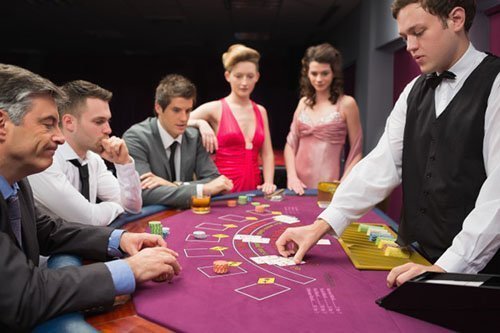
Leader Habit: A lot of them were gambling addicts for sure.
There aren’t private poker games in Vegas, maybe there are now. Mostly you’re going to have pros at the table who would take their money. These guys are amateur players. This was accessible. This had a mythology about it. There’s a whole science that went into like, “Who is at the table? How much they were playing for?” A lot of what drove them is a lot of them were gambling addicts for sure. It took me a while to see that. There were a lot of attributes that distinguish this game from other games.
It’s interesting how it all came together with the Ponzi schemes going on and it all came back into this group. It was a mixed group that you had there to begin with. It makes sense that it would all come back to this. When you showed the two fingers or Jessica Chastain shows the two fingers like, “Take the 2% off the table.” If you hadn’t had done that, you were legal? Up until that point?
Yes, but it was headed nowhere good fast. The train was coming off the track.
It is fascinating to me to see people who have gone through these horrific things, come back from it and survived to tell their story. You’ve done some amazing recovery from all this. I’ve had some interesting people on my show. I had Eric O’Neill who took down the biggest spy in FBI history. These are some of my favorite stories because they’re real. It’s pretty impressive to see what you were capable of doing. To be strong in a room full of tough guys like that. You’re running a business, what an entrepreneur mind you have. I’ve watched your interviews. I saw you were on Ellen. How much did you say you made in a night? What’s the biggest night that you’ve made money-wise?
I don’t remember my biggest night. I know I was making $4 million a year. I’ve definitely made $150,000 in a night.
It’s a different world when you get to that level. I’m sure this will be a whole different world going in this direction. You do a lot to help people. This is a fascinating story and I’m glad you shared it. A lot of people would want to find out more. They can go see the movie. They could read your book. Did you have websites or anything you want to share?
I have a website. It’s basically to collect people’s information for when we go out with different conferences, different things that we’re doing. That’s ImMollyBloom.com. My Twitter and Instagram are both @ImMollyBloom.
Thank you, Molly. This was fascinating.
Thank you.
You’re welcome.
The Leader Habit with Martin Lanik
I am here with Martin Lanik, who’s the author of the business bestseller The Leader Habit and CEO of Pinsight. His habit-forming leadership training focuses on a five-minute practice session woven throughout the day. Martin’s research-based formula has helped thousands of high-potentials, managers, directors, and executives in 30 countries build strong leadership skills. More than 100 companies including AIG and CenturyLink have implemented his programs, which have been featured in Forbes, Fast Company, Chief Learning Officer and at Monster.com. Martin holds a PhD in Industrial Organizational Psychology from Colorado State. It’s really nice to have you here, Martin. Welcome.
Thanks for having me.
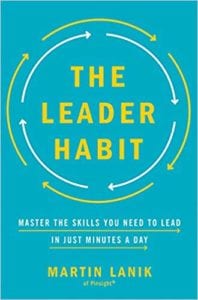
The Leader Habit: Master the Skills You Need to Lead in Just Minutes a Day
I teach a lot of leadership classes. There’s so much new information that can help people become better leaders. The habit part of your book is interesting to me, partly because we hear so much of how long it takes to establish habits. I’m married to a plastic surgeon. You’ve probably realized that that twenty-day habit rule came from that group. That people thought it takes 21 days to establish a habit. That was more tied into that group. Thinking how long it takes for them to accept how they look from their plastic surgery. How long do you think it takes to establish a habit? How did you determine that?
The 21 days seems to be the norm that everybody thinks. This is how many days it does take to build a habit. Indeed, it comes from plastic surgery. The research and behavior change, especially in health behavior, suggests that it’s 66 days on average. There are going to be individual differences. For some people it’s going to take longer, for other shorter. Some habits will take longer to establish, others shorter. On average it’s 66 days, about two months.
You’re looking at micro-behaviors. What do you mean by that?
If we think of leadership, that’s a set of habits. Half of our daily behavior is automatic. It’s the same way we take a shower, brush our teeth and make our bed in the morning. We don’t think about those behaviors, we just do them. We found that great leaders do the same thing. For them, leadership is as natural as making your bed in the morning. They’re well-ingrained habits. When we start looking at what’s the most efficient, effective way for people to build new habits, it turns out that the smaller the behavior you’re trying to turn into a habit, the faster and more successful you will be. That’s why we started to look at micro-behaviors. What are the tiniest behaviors that distinguish effective leaders from non-effective leaders? We conducted a global research study of about 800 managers and executives to identify these small behaviors. Outcomes of that research have been captured in my new book, The Leader Habit.
What did you find were some of the most important behaviors?
We found 79 of those. These micro-behaviors are grouped under leadership skills that we commonly use. Things like communication, innovation, delegating, empowering employees, planning and organizing, all of these classic leadership skills. At a higher level they form two groups. Leadership skills and behaviors that focus on getting things done and the ones that focus on managing people.
I’m writing a book on curiosity and the things that hold people back from developing curiosity. Did you get anything in that area in terms of behaviors? I don’t know if you’ve been studying that part of it. I’m curious if anything came in that would fall under the realm of curiosity?
We generally think of curiosity as a personality trait. It seems to be hardwired. Some people might call it openness to experience. We tend to call it curiosity. That’s the general approach to the world, to new information, new data. You close to change, open to change. From the perspective of The Leader Habit formula, these personality traits influence the leadership skills and leadership behaviors. Based on our personality, we’ll find that some leadership behaviors come to us naturally. Others come to us less naturally.
[bctt tweet=”Curiosity is the general approach to the world, to new information or new data.” username=””]When you look at leadership behavior like innovating, for somebody who is going to be high on curious, this is something that is going to come more naturally to them. Maybe they already developed that skill and they mastered it. It’s already a habit for them. Maybe they’re somewhere on the journey. If your personality supports this leadership skill that you’re trying to develop, it’s going to be easier for you to practice. You’ll find it more rewarding. You’re much more likely to keep practicing for the two months so that you can turn that behavior into a habit.
Even though my PhD is in business, my dissertation was on emotional intelligence. I love the psychology behind all this, of what makes leaders successful. We talk about personality traits. We talk about some of these things. We all are born somewhat curious. We see some of the things change as we go through our experiences in the working world. You were talking about innovation. It’s important that we’re thinking about the things that will help make us more innovative now with AI, such a big focus. What do you think were the biggest habits towards building innovation?
I could give you some of the micro-behaviors that we found in our research. One of the ones under innovation was looking for patterns between conflicting information. That is one micro-behavior that effective leaders did. Two pieces of information that on the surface may look like opposites and they don’t go together. People who are good at innovating were able to identify the common theme. Let me give you an example. You can pick this up in speech when people use the word but. Statements like, “Some of our customers will love this product, but other customers hate our product.”
It seems like two opposite ideas. If a leader is good at innovating, they’ll say, “A-ha.” All of our customers have strong emotions. That’s the underlying theme. That’s an example of a habit that you can build. You can train yourself. If you’re listening for the word but, that could be your cue to get thinking about, “How are these two ideas connected? What’s the underlying theme there?” If you practice this every day for 66 days, it’s going to become a habit. You’ll automatically be looking for these themes and increasing your ability to innovate through that process.
You have your book, but you also have training software? Is it tied into the book? What does that entail?
We take the concepts from the book and then form it into software that it’s scalable for organizations. We first assess people if they are moving into an executive position, for instance. You place them into an executive position in a simulated environment. We measure where they are so you get a solid baseline of their current skills. We have The Leader Habit app that takes the assessment information, generates a development plan, feeds these exercises do them on a daily basis and tracks their progress. It takes this idea of leadership habits and building those habits. Takes the exercises that we found through our research and then automates the process so that it’s easier to scale and easier for individuals to use.
I was working on an assessment as part of my book. It’s challenging to do that. I’m thinking about the app development part. How hard was that?
I’m a CEO of Pinsight, it’s a software company. We’ve been developing talent management solutions for the past eight years. It’s hard. We’ve had experience in this area. We have quite a bit of innovation as a skill on our team that makes it a bit easier.
You’ve mentioned that you came up with all these habits. How are those different than the 22 core skills?
When you think of the 22 core skills, those are the higher-level skills. Those are things like delegating, empowering others, innovating. For them to stick, you’ve got to break them down into smaller behaviors. That’s where the micro-behaviors come into play. We found that a skill might consist of three, four different micro-behaviors. Those are the micro-behaviors that you should be practicing on a daily basis. They’re small. These exercises take only five minutes or less. No matter how busy you are, you can do them. The benefit of these micro-behaviors is that they turn into habits quickly.

Leader Habit: People who are high on curiosity and openness to experience seek information.
Is that something that we can talk about? Do you have to go about it some other way?
You look for patterns. The exercise would be after you or someone else uses the word but when describing two opposite ideas of how are these two things connected? That’s the actual exercise. The example I gave you is with the customers. Let’s say that you are in a conversation. You tell me that, “Most of my listeners love that show, but there’s some that hate it.” I will be listening for the word but and what I would think is, “How are these two things that appear to be unrelated, how are they connected?” and then I will say, “They’re strong emotions. Your listeners have strong emotions to your show.”
You have people focus on these 22 skills. Are there certain ones you pick more than others? Is it like StrengthsFinder where you try to pick some that you are better at than others? How does that work?
You want to pick the ones where you’ll see most success. That’s determined by two things. You’ll find most growth in the areas where you are at a medium level. You haven’t mastered them but you’re not starting from ground zero. You want to find the ones that come naturally to you through your personality. We have a little personality assessment in the book. There’s also one available online at the LeaderHabit.com that people can take for free. It will highlight what are the top five most natural leadership skills for you? What are the least natural skills for you? You want to start with the top one, especially if there are gaps and if you have room to grow.
I’m certified to give some personality assessments. What things are you looking for in the personality assessment? Is it an introvert, extrovert thing?
We use Big Five personality instrument. That seems to be the most common. Most personality researchers and psychologists would agree that this is the model of personality that’s most widely used.
How often are you seeing openness to experience at the top of some of their skills?
It would be the skills that are related to strategic thinking, innovation, and leading change. That’s when you see openness to experience, curiosity to be important. This makes sense because it’s all about change. It’s all about trying new things, then being able to also see the bigger picture. It’s been often linked to visioning and strategy. People who are high on curiosity, openness to experience, they seek that information. They enjoy that type of perspective.
How do you develop openness to experience in their followers, for leaders, even if they have high levels?
This is where the psychologist would say, “Diane, that’s a good question but they’ll take about ten years.”
Why do you think that’s hard to develop in other people? I found four things were holding people back from curiosity. I found fear. There are assumptions that they won’t like it, they’re not interested, it’s stupid. Technology either does it for them or they can’t figure it out. Environment, their teachers may be taught to the tests, their parents told them, “You have to do this in your life.” There are all these factors that hold people back. If we have young people starting off curious, they get into school age and then it drops off. It shouldn’t take us long to get it back if it came to us naturally. Why is this a problem for many people? Is it that we need to build this in at a younger age, the K through 12? What’s your thought on it?
[bctt tweet=”When someone proposes a new idea, instead of shooting it down, change your perspective and ask what it would take to do that.” username=””]I say ten years jokingly because if we think about this as a personality trait, it takes about ten years to change our personality. It’s the same as trying to get a person who is painfully introverted, to be this amazing, motivational speaker. That’s the same thing. We’re trying to change the person, their personality. Research shows that that’s extremely difficult to do. What we can change is our behavior. If we keep that behavior as small as possible, we won’t change the personality but we will change how we are approaching new experiences. One of the exercises that we found also under innovation is celebrating experimentation.
This is a habit that we can get into. Rather than addressing our fear, assumptions and the environment, we can do a tiny change on a daily basis. After someone proposes a new idea, instead of shooting it down, we would ask, “What would it take to try that?” We change our perspective. Through this one micro-behavior, we start to celebrate experimentation. When people are proposing new ideas to us, we ask, “How could we try this? What would it take to do that?” rather than shooting it down right away.
We need to change that behavior because many people have such great ideas and they hold back. How many times you’ve been in meetings where people, “Anybody have any questions?” and everybody’s looking around. They all probably have the same question. They don’t want to ask it for fear of looking stupid. I had a leader, you’d ask him a question and he’ll go, “I pretend I didn’t hear that.” What does that do? You’re never going to ask again. There are many people who shut people’s natural instincts to want to know things and to develop off. They don’t even realize it because they’ve worked for other leaders who’ve done that to them. That’s what they’ve learned. I like the idea of these habits because they’ve already developed some habits that aren’t great. How do they recognize bad habits?
Most people recognize the bad habits in themselves, at least the ones that they want to change. There are these habits that are holding us back. What I often get the question is, “How come Suzie got the promotion and not me?” Usually it’s a bad habit that’s holding you back. The first step is to ask some people, seek feedback or get a comprehensive assessment. A simulation assessment where there are professionals observing you in action in those leadership roles and can highlight what are the bad habits that you have.
It’s tough to hear about your bad habits, isn’t it? No one wants it.
Even if we do want to hear about them, we’re not always open to them and curious enough to hear it.
It’s hard to deliver that news to someone too. It’s tough because you’re dealing with self-esteem. You’re dealing with all these things. It’s a challenge. I could see why you would find this interesting because I think a lot of everything in life is a habit. Getting used to it. When you were raised to do certain things a certain way, our environment plays much of an impact on our habits. That’s what we’ve always known around our house, around the school or whoever taught us these things. This is no easy thing to fix. One thing I see with all my students is if you give them the whole elephant to eat, they’ll freak out. You give them little bits. Is that what your intent was to not make it overwhelming?
When you think about that it takes 66 days on average to form a new habit, you’ve got to make it simple and easy. No matter how busy people are, they can find those five minutes a day and practice that behavior. That’s exactly the idea.
I’d like to know more about Pinsight. What else do you do at Pinsight? Can you give me a little more insight on Pinsight?
It’s a software company that builds HR technology solutions. We take the concepts from the book, The Leader Habit, and then build software around it. Our programs generally support executive leadership hiring projects. Helping organizations to identify who is the best fit for a particular role. That internal type of assessment and development projects like succession planning or identification of high potentials and preparing leaders for the next step up.
What makes Pinsight different is that we utilize simulation-based assessments. Rather than people taking tests or being interviewed, we throw them in a fictitious company for three hours at the target level. We let them test drive the job while we’re roleplaying with them different leadership challenges. It’s realistic with these live actors on webcam that you’re interacting with. That last ten minutes when people lose sense of reality becomes their job. It allows us and our team of psychologists to analyze every single move, every single behavior to determine if the person is ready or not. What would it take to get them ready? It’s fun. It’s challenging. There hasn’t been a single person who said, “This is a piece of cake.”
I helped implement a capstone change in my last company where I worked as a Program Chair for the MBA Program at Forbes School of Business. It was fascinating to take this simulation that we included. It wasn’t as virtual as what you’re talking about. Do you have actual people on video that you’re talking to? Is that what you’re saying?

Leader Habit: You have to solve those problems in real time.
Yes, exactly. Imagine you are a new executive in this fictitious company. You have access to email. Your calendar, you see scheduled meetings with live people. They call you. There’s a live person on the other end, role-playing with you. Pretending to be an underperforming employee, your board or an angry customer and you have to solve those problems in real time.
You say live. Is it pre-recorded or is it actually live?
It’s actual live. Somebody live on a webcam on the other end.
I’ve seen the pre-recorded versions, but I haven’t seen the live. Where are you located?
We’re located in Denver, but it’s a virtual company. We run these types of simulations around the world in eight different languages. We work all around the world.
If somebody wanted to learn more about this, do the simulation, hire you to train and speak or whatever you do, can you share how they could reach you and find out more?
The best place would be to go to The Leader Habit website, that’s LeaderHabit.com. There you can learn about our career solutions as well as take the online personality test that is free. They’ll help you determine what skills come to you naturally so you can put your development and your career plan together.
Thank you so much for sharing all this information. I appreciate it.
Thank you, Diane. I appreciate you inviting me to your show.
I want to thank Molly and Martin for being such great guests. I hope you join us for the next episode of Take The Lead Radio.
About Molly Bloom

About Martin Lanik

Important Links:
- Molly Bloom
- Molly’s Game: The True Story Of The 26-Year-Old Woman Behind The Most Exclusive, High-Stakes Underground Poker Game in the World
- Susan Cain
- Eric O’Neill – previous episode
- ImMollyBloom.com
- Molly Bloom on Instagram
- @ImMollyBloom – Twitter
- Martin Lanik

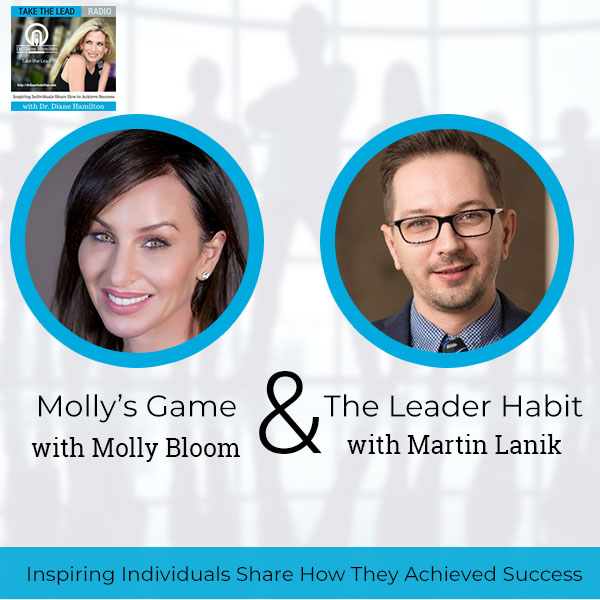
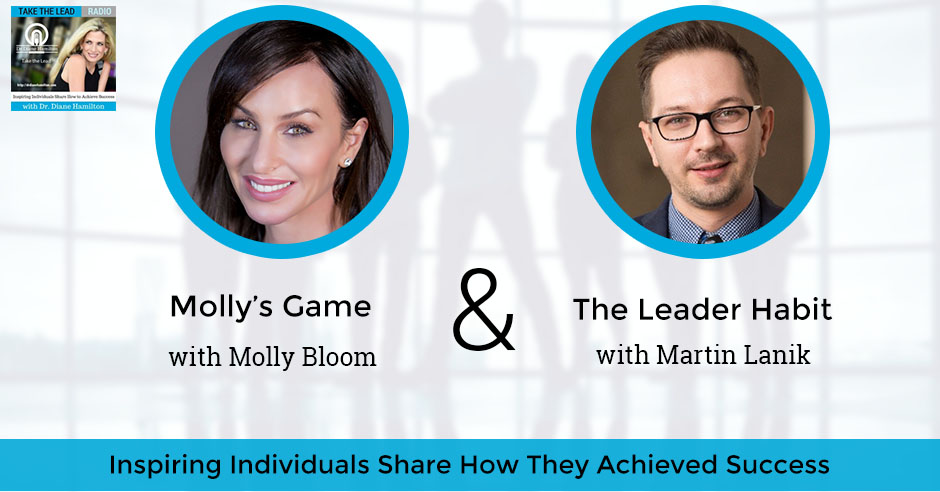

0 Comments